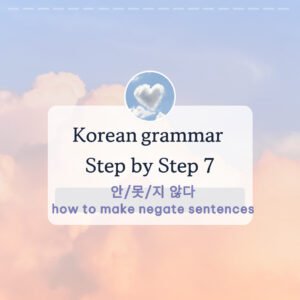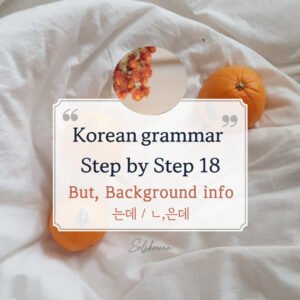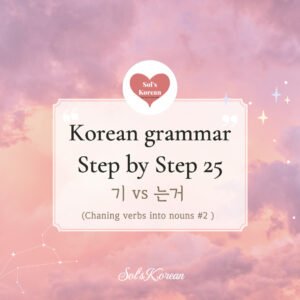Korean irregular Verbs conjugations (ㅡ/르/ㅂ irregular)
Hello, language learners! Welcome back to our journey of mastering Korean.
Today we will master Korean irregular verbs and adjectives! We will cover “르”, “ㅂ”, “ㅡ” irregularities!
In our previous post, we covered the basics of verb conjugation in the present tense.
Today, we’re going to delve deeper into the world of Korean verbs by exploring some irregular verbs and essential grammar points. These will help you form more complex and natural sentences.
So, let’s dive right in and learn more verbs with irregularities and some additional grammar tips!
Part 1,
Let’s grasp the concept of grammar
Basic Korean verbs & adjectives (present tense conjugations) #2
Do you remember from the last post?
If there are two vowels, we contract them to make it shorter, or if there is a double sound, we eliminate one.
Today, we will look at more examples of vowel & adjectives contraction cases.
Here’s the list of verbs we will go through together:
| 마시다 | to drink |
| 기다리다 | to wait |
| 가르치다 | to teach |
| 다니다 | to attend, to go regularly |
| 부르다 | to call |
| 모르다 | to not know |
| 다르다 | to be different |
| 게으르다 | to be lazy |
| 바쁘다 | to be busy |
| 예쁘다 | to be pretty |
| 아프다 | to be sick |
| 크다 | to be big |
| 쓰다 | to write, use, wear |
| 듣다 | to listen |
| 걷다 | to walk |
1. ㅣ Vowel Contraction
When the verb stem ends in ㅣ, it contracts with 어 to form 여.
Let’s look at this verb: 마시다 (to drink)
First, we will remove the ending 다, leaving us with the verb stem “시“.
Here, the verb stem’s vowel is ” l “, right?
If the vowel is neither ㅏ or ㅗ, we will add 어요.
So, It becomes 마시어요, We then combine 시 + 어, which turns into 셔.
Therefore, 마시어요 becomes 마셔요.
Example: 저는 물을 마셔요. (I drink water.)
Here’s more cases:
기다리다(to wait) → 기다리어요 → 기다려요
Example: 저는 친구를 기다려요. (I wait for my friend.)
가르치다(to teach) → 가르치어요 → 가르쳐요
Example: 저는 한국어를 가르쳐요. (I teach Korean.)
다니다(to attend, to go regularly) → 다니어요 → 다녀요
Example: 저는 회사에 다녀요. ( I go to a company = I work)
2. “ㅡ” irregularity
For “ㅡ” irregular verbs, when conjugating to the present tense, you drop the “ㅡ” from the stem.
Then, you look at the vowel before the “ㅡ” (if there is one) to determine the appropriate conjugation:
Let’s look at this adjective: 바쁘다 (to be busy)
First, we will remove the ending 다, leaving us with the verb stem “쁘”.
Here, the verb stem’s vowel is ” ㅡ “, right?
We will drop the ㅡ part of the verb stem., and If the vowel before “ㅡ” is ㅏ or ㅗ, you add 아요.
If the vowel before “ㅡ” is any other vowel, you add 어요.
For 바쁘다, The vowel before “ㅡ” is ㅏ (in “바”), so we add 아요.
Therefore, 바쁘다 becomes 바빠요.
Example: 우리 아빠는 주말에 바빠요. (My dad is busy on the weekend.)
Here’s more cases:
예쁘다(to be pretty) → 예뻐요 (The vowel before “ㅡ” is “ㅖ”, hence we add 어요)
Example: 내 친구는 정말 예뻐요. (My friend is really pretty.)
아프다(to hurt) → 아파요 (The vowel before “ㅡ” is “ㅏ”, hence we add 아요)
Example: 다리가 아파요. (My legs hurt)
크다 (to be big) → 커요 (There is no prior vowel, the general rule is to add 어요)
Example: 이 박스는 정말 커요. (This box is really big)
쓰다 (to use, write and wear(glasses and hat) ) → 써요 (There is no prior vowel, add 어요)
Example: 편지를 써요. (I write a letter)
선글라스를 써요. (I wear sunglasses)
아이폰을 써요. (I use iPhone)
3. “ㄷ” Exceptions!!
There are some verbs with a final “ㄷ” batchim that change to “ㄹ” when conjugated.
Though they aren’t numerous, it’s best to simply memorize them.
Let’s look at this verb: 듣다 (to listen)
First, we will remove the ending 다, leaving us with the verb stem “듣”.
Here, the verb stem ends in ” ㄷ “(final consonant), right? we will change to “ㄹ”.
And since the vowel is ㅡ, we add 어요. It becomes 들어요.
Example: 항상 K-pop을 들어요. (I always listen to K-pop.)
There are only a few, let’s just memorize them!
걷다(to walk) → 걸어요
깨닫다(to realize) → 깨달아요
묻다(to ask) → 물어요
싣다(to load) → 실어요
Regular “ㄷ”ending verbs.
믿다(to believe) → 믿어요
닫다(to close) → 닫아요
받다(to get, receive) → 받아요
4. “르” irregularity
When the verb stem ends in 르, an additional ㄹ is added before conjugating,
and the 르 changes to 라 or 러 depending on the preceding vowel.
Let’s look at this verb: 모르다 (to not know)
Here, the verb stem ends in 르, we add ㄹ to the prior syllable 모, which becomes 몰.
Since the vowel before 르 is “ㅗ”, we conjugate with 아요, resulting in 몰라요.
Example: 한국어 잘 몰라요. (I don’t know Korean well.)
Here’s more cases:
다르다(to be different) → 달라요 (The vowel before “ㅡ” is “ㅏ”, hence we add 아요)
Example: 한국어랑 영어는 달라요. (Korean and English are different)
빠르다(to be fast) → 빨라요 (The vowel before “ㅡ” is “ㅏ”, hence we add 아요)
Example: 치타는 정말 빨라요. (Cheetahs are really fast)
부르다 (to call) → 불러요 (The vowel before “ㅡ” is “ㅜ”, hence we add 어요)
Example: 엄마가 나를 불러요. (My mom calls me)
게으르다 (to be lazy) → 게을러요 (The vowel before “ㅡ” is “ㅡ”, hence we add 어요)
Example: 나는 가끔 게을러요. (I’m lazy sometimes)
5. “ㅂ” irregularity
For “ㅂ” irregular verbs, the verb stem’s batchim “ㅂ” changes to “우”.
Then, “우” combine with “어요”, forming “워요”.
Let’s look at this verb: 춥다 (to be cold)
Here, the verb stem ends in ㅂ, we change ㅂ to 우, which becomes 추우.
Since the vowel is “ㅜ”, we conjugate with 어요, resulting in 추워요.
Always, it’s conjugated as 워요. You can simply memorize it.
Example: 한국 겨울은 추워요. (Korean winter is cold.)
Here’s more cases:
덥다(to be hot) → 더워요
Example: 필리핀은 정말 더워요. (Philippines is really hot)
어렵다 (to be difficult) → 어려워요
Example: 중국어는 어려워요. (Chinese is difficult)
쉽다 (to be easy) → 쉬워요
Example: 한국어는 쉬워요 (Korean is easy)
귀엽다 (to be cute) → 귀여워요
Example: 우리 강아지는 귀여워요 (My dog(puppy) is cute)
* 강아지 means puppy, but we often use it to refer to a dog in general. The term 개 (dog) can sound harsh!
There are more irregularities, but we won’t focus on them right now.
As you continue learning Korean, you’ll encounter and learn them naturally.
Our main goal now is to practice making sentences together using these verbs. Let’s get started!






